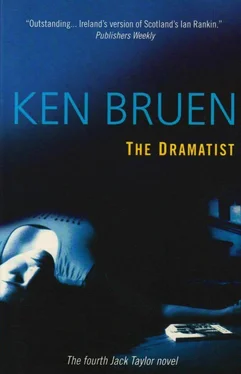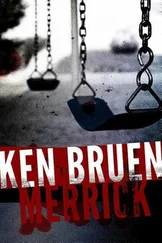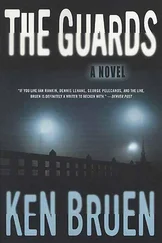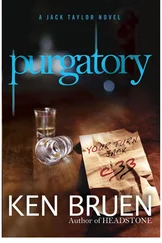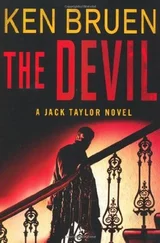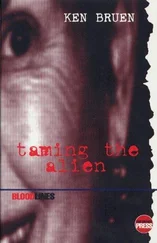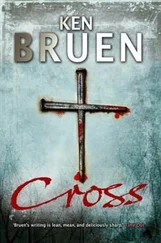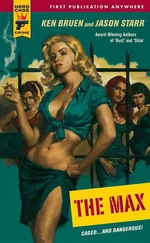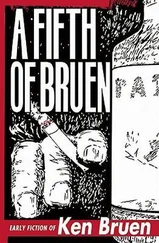Jesus, who wouldn’t drink? Alas, there wasn’t enough Jameson in the world to erase the stench of my abandonment. I had left her to waste away.
I trolled through the data of my present.
Tim Coffey, murdered on my account. A nutcase, obsessed with Synge, who’d killed two girls and was playing mind games. Not to mention the bloody vigilantes — Pikemen for Chrissakes.
I brewed some coffee, told myself I could really savour it without the shield of nicotine. The stillness in the room was startling. Moved, turned on the radio, caught the tail end of Coldplay’s “Yellow”.
That was definitely today’s colour.
The news followed. Robin Cook had resigned from Blair’s government. Saddam Hussein had been given seventy-two hours to leave Iran. The second UN resolution was no longer relevant. War was coming, lethal and soon. Then the local news: three bodies had been taken out of the canal, one was a black man.
Then,
“In Kinvara, a Galwayman has been seriously injured in a hit and run. He was well known in the area as president of the Vinegar Hill Association.”
I took a deep breath.
President of the Vinegar Hill Association? The most famous event in the rebellion of 1798, the hour of the pikemen. I knew a girl at Galway Bay FM and rang her, wrangled the name of the victim from her. Ted Buckley. Then I got the number of the hospital, called and asked for intensive care, got put through to the nursing sister, said,
“Good morning, this is Sean Buckley. My brother Ted was brought in last night.”
“Yes?”
“How is he doing?”
“He sustained serious injuries, Mr Buckley. His back is broken and his legs; he has head injuries, too.”
“Oh God.”
“Shall I put you through to the doctor?”
“Um, no. Is his wife there?”
I could hear the dawning suspicion. She went,
“Mr Buckley is single. Who did you say you were again?”
I hung up.
Back to the phone directory and there he was:
Edward Buckley
21, Corrib Park
Galway
Underneath was “Vinegar Hill Association, situated at Kinvara”.
Operated it from home with a branch in Kinvara. I thought back to my hooded drive in the van, ten minutes or so. I put on my all-weather coat and figured the walk would be good for my limp. Took me twenty minutes to get to Corrib Park, and it was a hive of activity. People everywhere, which could only be a good thing. I walked up to No. 21, rang the doorbell, hoping to hell he didn’t have a dog. No sound. I moved round to the back and began to move bins, checking the neighbouring houses for watchers. No indication. I used my elbow, hard and fast, broke a pane, got the window open and climbed in. If a neighbour was calling the guards, I’d know real soon. I was in the kitchen, which had that fussy tidiness of a bachelor. I recognised the signs from my years of aloneness. Single guys go either way. Slob or neat-compulsive, and he was definitely the latter. Not even a cup draining on the sink. The floor spotless, tea cloths folded, lined regimentally. I almost felt for him. Checked my watch, fifteen minutes, and let out my breath. No guards. Went through the other rooms. Same deal, tidy as obsession. A bookcase, all Irish history, concentrating on 1798. A heavy framed drawing of a priest above the fireplace — Fr Murphy, hero of the rebellion.
Found a door to the basement, hit the wall switch and went down. Here it was, the long wooden table, the pikes on the wall. I whispered,
“Gotcha.”
Back upstairs, I collected all the paper I could and pulled down the linen curtains. Took me a time and my knee ached, but finally I’d laid a line of paper and clothes from the kitchen to the basement. I remembered his nicotine-stained teeth and, in the press beneath the sink, found lighter fluid. Doused the trail of paper, concentrating on the kitchen and trail end in the basement. Matches were stacked neatly alongside a gas stove. I opened the kitchen door, lit a match, let it drop, said,
“Whoosh.”
Lawrence Block, in Out on the Cutting Edge, has his character, Matt Scudder, at an AA meeting where a woman recounts how she used to take the first drink of the day as soon as her husband left for work. She kept the vodka bottle under the sink, in a container that had previously held oven cleaner.
“The first time I told this story,” she said, “a woman said, ‘Oh dear Jesus, suppose you grabbed the wrong jar and drank the real oven cleaner.’
“‘Honey,’ I told her, ‘get real, will you? There was no wrong jar. There was no real oven cleaner. I lived in that house for thirteen years and I never cleaned the oven.’
“Anyway,” she said “that was my social drinking.”
I love that story.
Ran it through my mind two days later as I entered Nestor’s. The sentry was at the bar, sunk in gloom, muttered,
“The bombing’s begun.”
Cathy was tending bar, a very rare occurrence. I leaned on the counter, asked,
“Where’s himself?”
“He had to meet somebody.”
She assessed me, said,
“I am very sorry for your mother. Jeff was out of town, and I couldn’t get a babysitter.”
I nodded. The sentry perked up, asked,
“Did somebody die?”
We didn’t answer him. Cathy asked if I wanted a coffee and I declined. I was running options in my head and then she added,
“How is Stewart?”
It took me a moment to focus, then I said,
“He’s in jail, how did you think he’d be?”
She mulled it over, asked,
“Are you working for him?”
“Good question.”
She began to polish the counter. It was already buffed to a professional level. Course it meant I had to move my elbow and step back. She said,
“I dropped the dime.”
“What?”
“On Stewart. I gave him up.”
I was stunned, tried to get a handle on it, said,
“You called the guards?”
“Sure, the drug squad.”
Her face as she said this was neutral, no emotion showing. I thought of Sinéad O’Connor blowing the whistle on Shane McGowan. I almost stammered, got out,
“He was your friend.”
She gave a brief noise of disdain, said,
“He was a drug dealer; they don’t do friendships.”
And neither, I thought, do you. Said,
“The poor bastard got six years.”
“Sufficient time to clean up, don’t you think?”
I was too rattled to say what I thought, tried,
“See you later.”
I was at the door when she called,
“We’ll get a mass card for your mother.”
I could hardly wait.
Round the back of the pub is a shed/garage where Jeff keeps his beloved Harley. Next to Cathy and their daughter, it is his most treasured possession. A soft-tail custom, he keeps it in immaculate condition, every spare moment given to polishing, cleaning and maintenance. The few times I’d seen it, the chrome and metal were shining. You want to hear true passion, ask him about the bike. He moves to another level as he extols the machine. To try and grasp the zeal, I’d read Gary Paulsen’s Pilgrimage on a Steel Ride . I got some notion of the sheer love a Harley inspires but far from a complete understanding. Harley freaks are simply another species. Jeff had told me a Harley breaks down more times and has more problems than all other bikes put together. I’d asked,
“Why bother?”
And his look of horror as he gasped,
“Man, they’re a thoroughbred. You don’t exchange the best because they’re finely tuned. It’s what makes them great.”
The shed wasn’t locked and I pulled open the door, hit the light switch. The Harley was in the centre, looking fucked. I bent down, got a look at the front. The metal was heavily dented, mud and dirt streaked along the side. The rim of the heavy tire was almost cut open. Heard a voice,
Читать дальше
